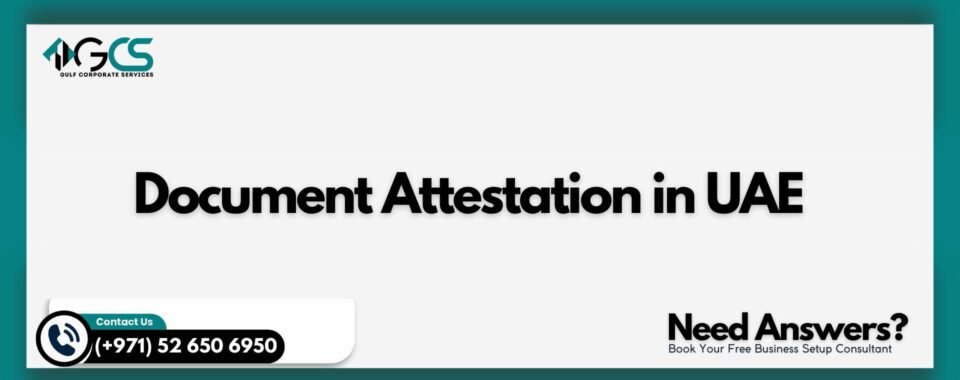
Moving, working, studying, or doing business in the UAE often means dealing with document attestation in UAE. Whether it’s a degree certificate, power of attorney, marriage document, or company paperwork, knowing how to attest these documents is essential. This guide walks you through everything—step by step, in clear, human terms.
What Is Document Attestation in UAE?
Document attestation means getting official approval for your original documents, confirming they are genuine and valid for use in the UAE. It’s a form of authentication.
Why It Matters
Without proper attestation, your documents may be rejected by UAE authorities. Whether you’re opening a bank account, enrolling in school, or applying for a work permit, your papers must be verified across multiple levels.
How the Process Works
- Notary attestation in your home country
- Foreign affairs ministry attestation in your home country
- UAE embassy attestation in your home country
- MOFA (Ministry of Foreign Affairs) attestation in the UAE
This chain ensures your name, signature, and content are officially accepted.
Why Is Document Attestation Important in the UAE?
Attested documents are vital in many aspects of life in the UAE:
- Work visas and residency: Needed for processing labour and immigration
- Education: Required for schools, universities, and scholarship approvals
- Business setup: Used for trade licenses, partnership agreements, and visas
- Legal processes: Courts, notarization, and inheritance filings demand original verified documents
- Personal affairs: Marriage certificates, divorce papers, and family sponsorships all need proper verification
Skipping attestation can cause delays, rejected applications, or legal issues.
Types of Documents That Require Attestation in the UAE
Types of documents that require attestation in the UAE include educational certificates, marriage and birth certificates, power of attorney, commercial agreements, and employment documents. These documents must be verified to be legally accepted by UAE authorities for purposes like visa applications, company setup, family sponsorship, and court procedures.
Educational Records
- Degree certificates
- Transcripts and mark sheets
- School leaving certificates
- Diplomas and training certificates
They verify your credentials for jobs, licensing, or further education.
Personal Documents
- Birth certificates
- Marriage certificates
- Divorce papers
- Death certificates
- Affidavits, sponsorship letters, and no-objection certificates (NOCs)
Used for visa applications, family sponsorship, inheritance, or legal matters.
Commercial and Company Documents
- Trade licenses
- Power of attorney (POA)
- Board resolutions
- Memoranda of association (MOA)
- Articles of association
These are essential to set up companies, open bank accounts, apply for government approvals, or grant authority.
Step-by-Step Guide to Document Attestation in UAE
The document attestation process in the UAE starts with notarization in the home country, followed by Ministry of Foreign Affairs (MOFA) attestation, and final verification by the UAE Embassy. After arriving in the UAE, the MOFA in UAE completes the attestation for legal use across government and private sectors.
Step 1 – Notary Attestation (in your home country)
Start by getting your document notarized by a public notary. The notary confirms your signature and, indirectly, the document’s origins.
Step 2 – Ministry of Foreign Affairs in Your Country
Next step: foreign ministry authentication. This proves your document is genuine and duly notarized.
Step 3 – UAE Embassy in Your Country
Now, present the document to the UAE embassy for their stamp, confirming UAE government acceptance.
Step 4 – MOFA Authentication in UAE
Once in the UAE, you visit the Saudi court or a typing centre that helps with Ministry of Foreign Affairs (MOFA) attestation. The MOFA stamp is the final seal of authenticity.
Localized Attestation Processes by Document Type
Localized attestation processes in the UAE vary based on the document type. For example, educational documents require verification from education boards, while commercial documents need chamber of commerce approval. Personal certificates like marriage or birth must go through municipal or civil authorities before MOFA attestation for legal acceptance in the UAE.
Education Certificate Attestation
For degree and school certificates, you’ll need:
- Notary
- Ministry of Education
- Foreign affairs
- UAE embassy
- MOFA
Transcripts may follow a similar pattern.
Personal Document Attestation
- Birth and marriage certificates need home country notary, foreign affairs, UAE embassy, and MOFA
- Certificates from abroad must pass the full chain
Commercial & Company Documents
- POA, MOA, board resolution: Notary → Home foreign ministry → UAE embassy → MOFA
- These are vital for legal, business, banking, and licensing processes
Where to Attest Documents in the UAE
You can attest documents in the UAE through the Ministry of Foreign Affairs (MOFA), located in major cities like Dubai, Abu Dhabi, and Sharjah. Some typing centers and authorized service providers also offer assistance. Ensure all documents are pre-verified by relevant departments before submitting them to MOFA for attestation.
Ministry of Foreign Affairs (MOFA)
MOFA offers attestation services at official centres and approved typing centres. Charges are reasonable and vary by document type.
Typing Centres and Service Providers
These are reliable options for handling multiple-step attestation. They prepare documents and submit them to MOFA on your behalf.
Coordinates with Embassies and Home Authorities
For embassy stamps, typing centres often handle submission and collection for convenience.
Costs and Timelines for Attestation
The cost of document attestation in the UAE depends on the type of document and urgency. Standard processing usually takes 3 to 5 working days, while express services are faster but more expensive. Fees can range from AED 150 to AED 500 per document, depending on the issuing and destination authorities.
Cost Components
- Notary fee (varies by country)
- Foreign ministry fee (your country)
- UAE embassy fee
- MOFA stamp fee
- Typing centre service charge
Typical MOFA fees range from AED 20 to AED 150 per document; embassy and home country steps will vary.
Timelines
- Notary to embassy: 3–7 days
- Embassy to UAE shipping: 1–2 weeks (express courier available)
- In-country MOFA: 1 day or less with proper documents
Total timeframe: 2 weeks to a month. Expedited services can shorten it.
Common Challenges and Solutions
Common challenges in document attestation include missing stamps, incorrect translations, and delays in approvals. These issues can slow down the process or lead to rejections. The best solution is working with authorized attestation experts who understand UAE requirements, ensuring your documents are accurate, complete, and processed without unnecessary setbacks.
Wrong Stamp Sequence
Submitting documents out of order (e.g., embassy before notary) can cause rejections. Follow the proper sequence.
Language Issues
Documents in local languages must include certified English translations. Both versions should be attested.
Document Damage or Age
Old or damaged papers may be rejected. Request new copies, ideally certified by issuing authority.
Time-Sensitive Documents
For visa or business deadlines, use express attestation services or partnering agencies.
Legal Validity Limits
Some documents require periodic re-attestation or updated versions. Check requirements for aging documents.
Why Use a Professional Attestation Service
Using a professional attestation service saves time, reduces stress, and ensures accuracy. Experts handle all steps—verification, translation, stamping—without errors. They’re familiar with UAE regulations and keep your process smooth and compliant. For busy individuals or businesses, this support means faster approval and peace of mind with every document submitted.
Save Time and Hassle
They handle the sequence, embassy liaison, and MOFA visits on your behalf.
Avoid Mistakes
These experts know formatting, stamp order, and legal wording—you avoid costly errors.
Courier and Translation Help
Services include pickup, delivery, and certified translation if required.
Attestation for Specific Purposes
Document attestation in the UAE is often needed for specific purposes like employment, education, residency visas, marriage, or business setup. Each purpose may require different document types and approval steps. Ensuring the right paperwork is attested helps meet legal requirements and avoid delays in personal or professional processes.
Visa and Residency
Birth and marriage certificates must be attested for dependents and visa issuance.
Employment
Degree certificates require attestation to prove education to the UAE government.
Company Formation
Board resolution, POA, and trade license require attestation for official filings and bank services.
Legal Cases
Power of attorney and affidavits must be attested for court proceedings or local legal use.
Timeline Optimization Tips
- Start early, leave buffer days
- Use courier for embassy submissions
- Expedite MOFA tasks through typing centers
- Ensure fees and formats are correct before submission
Legal Validity and Renewal
- Documents remain valid as long as content hasn’t changed
- Some may require periodic re-attestation—especially sealed legal documents like POAs or contracts
Attestation vs. Legalization vs. Apostille
- Attestation: Multiple ministry stamps, including MOFA
- Legalization: Same process, emphasizes embassy stamp
- Apostille: Multilateral documents under Hague Convention—rarely used for UAE
Document attestation in UAE refers to the complete authentication chain recognized by UAE authorities.
Digital Attestation Trends
- Small moves toward digital authentication
- Typing centres often offer e-trackers
- Fully digital attestation is still developing
Until then, paperwork and MOFA stamps remain standard.
Avoiding Fraud and Fraudulent Documents
- Never use backdoor attestation routes
- Stick to approved centre lists
- Look for official stamps, holograms, signatures, emblems
- Report fraudulent centres to MOFA
Checklist Before Submitting
- Originals and copies prepared
- Translation done if needed
- Notarized in correct format
- Foreign ministry attestation complete
- UAE embassy stamp in place
- MOFA-ready format and deadlines met
- Courier prepared, fees ready
- Third-party attestation agency selected (optional)
Choosing the Right Attestation Partner
- Check reviews and MOFA approval
- Ask about timelines, costs, and courier options
- Ensure tracking services and standardized updates
- Confirm facilities for emergency or weekend processing
Conclusion
Document attestation in UAE is essential for anyone planning to live, work, or do business there. It protects your credentials, builds trust with authorities, and supports legal validity. With the right sequence, timelines, and reliable provider, you can get your attested documents quickly and stress-free.
If setting up a company in the UAE, this process is critical. Visit Business Setup in the UAE professionals who streamline your journey—helping you focus on growth while they manage paperwork.
FAQs
How long does attestation take in UAE?
Typically 1–2 business days if your documents are in order and MOFA fees are paid.
Can attestation be done remotely?
Yes—with courier support and trusted typing centres. Originals must still go through MOFA in person.
How much does document attestation cost?
MOFA fees range from AED 20–150 per document; embassy and home country steps vary. Service fees add on top.
Are translations needed?
Yes, documents not in English or Arabic require certified translations before attestation.
Are attested documents permanent?
Generally yes, unless the document content changes. Some documents may need periodic re-attestation depending on UAE usage.
Can personal copies be certified?
Yes. If your home authority confirms a copy is identical to the original and notarizes it, it can be attested.








